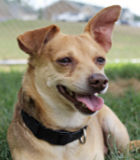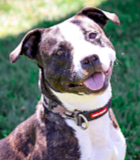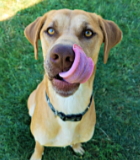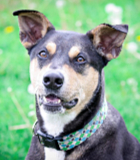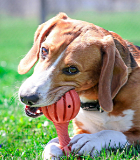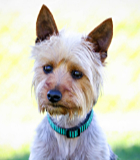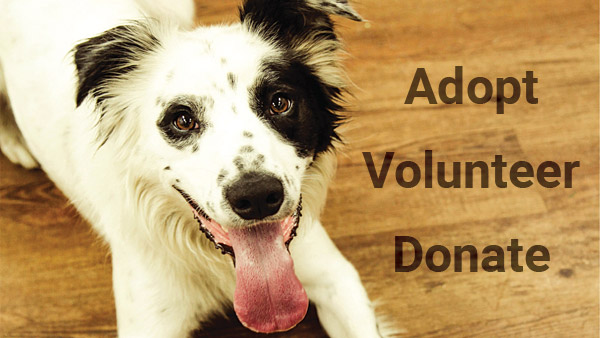Teaching Your Dog to Play Fetch
- This topic has 0 replies, 1 voice, and was last updated 14 years, 11 months ago by
Mackenzie’s Admin.
-
AuthorPosts
-
June 17, 2010 at 5:22 pm #543
Mackenzie’s Admin
MemberPlaying fetch is a great way to have fun with your dog and exercise him at the same time. If you’re lucky, your dog plays fetch naturally, but few dogs intrinsically understand the concept of retrieving. Some dogs will chase after the toy but then won’t bring it back, while others simply look at you with a confused expression, wondering why you repeatedly throw the toy away! Helping your dog learn to love retrieving can be as simple as finding a toy he really likes or as complex as training the entire sequence of chasing, picking up and bringing back the toy.
Choosing the Right Toy
Dogs can be very particular about the toys they’ll play fetch with. Some prefer a tennis ball, others a Frisbee®. Still others are happiest with a plain old stick. Experiment with different toys and see which ones excite your dog the most. Avoid small or smooth balls that he could swallow, and don’t pick something edible, like rawhide. If the Frisbee is your dog’s favorite fetch toy, buy one specially made for dogs. Frisbees made for humans are hard enough to chip a dog’s teeth. There are a host of good fetch toys on the market. Here are a few popular choices to try:Tennis ball
Retriever plastic or rubber bumper
Air KONG® squeaker tennis ball
Soft Bite Floppy Disc® or the BOODA® Flyer™
KONG Flyer (made of soft, flexible rubber)
Hyperflite® Jawz™ Disc (semi-flexible plastic Frisbee made specifically for disc dog competitions), SoFlite™ Disc (extra-soft for sensitive mouths) or FrostBite™ Disc (stays soft and flexible in cold weather)
KONG Toy (comes with or without a rope attached)
Chuckit!® Flying Squirrel fetch toy (also comes in a plush form)
Planet Dog Orbee-Tuff® Orbee Ball
If your dog doesn’t like to put toys in his mouth, try soaking a plush toy or a tennis ball in chicken stock or stuffing an old sock with treats. This will entice him to taste the toy, and you can reward him for this by giving him a treat. He’ll soon figure out that putting the toy in his mouth pleases you to no end, and then you can start teaching him to fetch it.The Reluctant Retriever
For dogs who really don’t grasp the concept of chasing after toys at all, you need to start with the basics. If your dog likes to play tug-of-war, teach him to go get a fetch toy so that you can play tug with it. Start by playing a short game of tug with a soft toy that your dog likes to tug on. Then take the toy from his mouth, tease him a bit by wiggling it on the ground, and toss it just a few inches away. If your dog runs to the toy, immediately snatch it up and start another fun game of tug. If he just stands there and looks at the toy you’ve thrown, reach out and wiggle it around on the floor again until he finds it irresistible. As soon as he goes for it, toss it another few inches away. Continue doing this until your dog chases after the toy. When he does, you can reward him with another quick tug game. Soon he’ll reliably chase the toy when you toss it, and you can start throwing it greater distances. Encourage your dog to come back to you by reaching for the toy in his mouth and tugging on it. When he gets the idea that bringing the toy back to you leads to a tugging battle, he’ll be eager to run and fetch the toy. Once you start throwing it a few feet, it’s helpful to turn and run away as your dog comes toward you with the toy. This will encourage him to run faster and chase you. When he catches up to you, play tug with the toy. Eventually, you won’t have to play tug every single time your dog fetches the toy, but be sure to do so intermittently to keep him eager to play.On the other hand, if it’s treats that your dog likes, you can teach him to fetch a toy for the promise of a yummy tidbit. Show him the toy and toss it a few inches away. Even if he only watches the toy at first, praise him and give him a treat. After three or four repetitions of this, encourage him to chase after the toy. As he takes a step or two toward it, praise and give him a treat. Repeat this three or four times. Next, toss the toy and see if he’ll sniff it or put his mouth on it. If he doesn’t, touch it yourself—wiggle it a bit. The instant your dog moves his mouth toward the toy, praise and reward him with a treat. Ask for a little bit more from him each time, until he’s actually picking up the toy. When he does, go wild with your praise, and give him a small handful of treats! At this point, he’ll think that the toy is pretty interesting, so try tossing it farther. Encourage him to come back to you when he’s got the toy in his mouth. Some dogs have to learn that they can actually walk and hold something at the same time, so be patient. If your dog drops the toy, say “Uh-uh, get the toy,” and point to it. He’ll figure out that the only way to earn his reward is to bring the toy to you, so he’ll either stop dropping it or he’ll go back and get it when he does drop it. Once your dog learns the fetch game, he might enjoy it enough that you won’t need to give him treats each time he brings the toy back, but in the beginning, be sure to praise and reward him for every fetch.
Another variation on this exercise is to use a toy that you can stuff with treats, such as the Genuine Dog Gear Toss ‘N Treat or the Zogoflex® Tux™ treat ball. Show your dog that you’re stuffing his favorite treats into the toy, and then toss it a few inches away. When he sniffs or mouths it, quickly pick it up and give him some of the treats inside. Then stuff a few more in the toy and repeat the sequence. Keep doing this until your dog learns that the quickest way to get the treats is to bring the toy back to you.
The Bait-and-Switch Game
If your dog loves to chase and pick up the fetch toy but isn’t keen on bringing it back to you, try the bait-and-switch game with two identical toys. Show your dog one of the toys. Get him excited, throw it, and encourage him to fetch it. When he picks it up, call him, then show him the other toy, and act as though you’re going to throw it in the opposite direction. He’ll probably drop the first toy and come running to chase after the second one. While he’s chasing that one, go pick up the first toy and repeat the sequence. This exercise will get your dog used to picking up a toy and turning to run back to you. Here’s the next step: Call him when he’s picked up the first toy, but don’t show him the second one right away. Hopefully, he’ll turn and run back to you while still holding the first toy in his mouth. When he gets close to you, say “Drop it.” Then show him the second toy. He’ll drop the first toy in order to chase after the second one. Now you won’t have to walk so far to pick up the toy he drops. This game will be easy for your dog to learn and can really tire him out. Eventually, your dog will probably figure out that he should spit out the ball he has when you say “Drop it.” At that point, you can try just picking up the ball he’s dropped at throwing that. This final step will eliminate the need for a second ball.More Tips for Playing Fetch
Once your dog is happily running after the toy, try holding him back by the collar while you throw it. Tempt him by saying, “Oh, do you want it? Are you gonna get that ball?!” When he seems really eager to go after the toy, excitedly say “Okay, get it!” and let go of his collar. The extra bit of frustration he feels when you hold him back will encourage him to be even more enthusiastic about going after the toy when you finally release him.
If your dog goes after the toy quickly but comes back to you slowly, call him and run away from him at the exact moment he picks up the ball. Dogs love to chase, and he probably won’t be able to resist running after you. Praise him when he catches up to you. If you consistently do this for a few weeks, your dog will come back faster, even when you don’t run.If your dog likes to play “catch-me-if-you-can” with the fetch toy, or if he simply prefers to go off with it and play by himself, attach a light leash or rope to the toy. Throw it, and when he picks it up, wiggle the line and run off in the opposite direction, encouraging him to chase you. If he follows after you with the toy, praise him and play a little game of tug or give him a treat. If he drops the toy, drag it behind you so that he can chase it. If he still tries to run away with the toy, pull on the line and reel him in. Praise and reward him when he gets close to you. Sometimes, throw the toy again quickly. Other times, let him keep the toy for a few minutes. This way, he won’t learn that every time he comes to you, you take his toy away. If you consistently play with a toy on a rope for a few weeks, your dog will stop trying to take off with it.
If your dog brings the toy back but won’t let you have it, say “Drop it,” and then put a tasty treat right in front of his nose. Few dogs can resist that, so he’ll probably spit the toy out. (If he doesn’t, try using a more exciting treat, like a small piece of cheese or chicken.) When your dog drops the toy, praise him and give him the treat. After a few repetitions, he’ll learn to drop the toy when you ask him to. Eventually, you won’t have to give your dog a treat every time he drops the toy. Throwing the toy for him again might be enough of a reward. But be sure to give your dog a tasty tidbit every once in a while to keep him eager to drop the toy when you ask him to.
If your dog returns with the toy but spits it out on the ground a few feet away, you can teach him to bring it all the way in to you. Watch him coming toward you. Just before he reaches the point where he’s likely to drop the toy, say “Bring it,” and wave him in with your arm while you walk a few feet in the opposite direction. When he sees you moving away, he’ll keep following you. When he reaches the spot where you were standing, turn and walk back to him. Tell him, “Drop it.” He’ll spit out the toy and back up. Praise him and throw the toy. If you do this consistently for a few weeks, your dog will learn the meaning of “Bring it,” and you can remind him as he’s coming in to bring the toy all the way to you.
If you want your dog to put the toy in your hand and he’d rather spit it on the ground, you can teach him to “Give it” to your hand. Before your dog has a chance to drop the toy, place your hand, palm up, underneath his jaw and say “Give it.” When he drops the toy, catch it. Praise him and throw it again right away to reward him. Do this consistently for a few days. Then test your dog by saying “Give it” and holding your hand out, palm up, in front of his mouth. If he reaches forward to drop the toy into your hand, praise him profusely and throw the toy again. If he drops it on the ground, say “Uh-uh, give it,” and keep your hand in place. Wiggle your fingers while you say “Give it” to show your dog that you want the toy in your hand. If he picks it up and tries to place it in your hand, praise him enthusiastically—even if he misses! (His aim will improve with practice.) If your dog keeps picking up the toy and dropping it on the ground, or if he just stares at the toy on the ground, walk away. When he picks up the toy to follow you, try getting him to put it into your hand again. Realize that if you teach a small dog to return the toy to your hand, it’s inevitable that he’ll jump up on you to reach your hand. So before you teach this skill, give some thought to whether you’re okay with your dog jumping on you, even when he’s wet and muddy. Be careful what you wish for!
If your dog drops the toy for you but then tries to snatch it up as you bend down to get it, teach him to sit and stay while you pick it up:
When your dog runs up to you with the toy and drops it, ask him to sit and stay. Praise him and bend down to pick up the toy. He’ll very likely try to grab it.
If he doesn’t, remind him to sit and stay, and calmly pick up the toy. When you’ve got the toy and you’re standing up straight again, say “Okay” to release your dog from the stay.Then reward him by throwing the toy.
If he does try to grab the toy as you bend down to pick it up, immediately say “Uh uh,” and quickly stand up. (If you’ve already picked up the toy, drop it on the ground in front of you before standing up. If you haven’t, just stand up, leaving the toy on the ground. If your dog has managed to snatch the toy and is holding it in his mouth, wait patiently until he drops it again.) Then ask your dog to sit and stay. When he does, praise him. Bend down to pick up the toy. If he breaks his stay a second time, quickly stand up straight again. Continue repeating this sequence until your dog figures out that if he wants you to throw the toy for him, he has to sit and stay while you pick it up. When he finally does hold the stay while you pick up the toy, immediately say “Okay!” to release him from the stay, and throw the ball to reward him.Stick to these rules every time you play fetch with your dog. Eventually, you’ll be able to pick up the toy while your dog waits politely.
If your dog becomes a real whiz at fetching, you can make the game more challenging for him with a few simple tricks. Try throwing the toy uphill so that he has to work harder to run after it. If you play in the house, you can throw the toy up a staircase. If your dog chases tennis balls, use a tennis racquet or a Chuckit! Ball Launcher to send the ball farther away.
If your dog prefers to chase a Frisbee, be careful not to throw it so he jumps up into the air to catch it. Dogs can easily get injured jumping like this. Even though you may have seen disc dogs take spectacular flying leaps after their Frisbees, realize that their handlers know how to throw a Frisbee to minimize the chance of injury. Throw the Frisbee low to the ground so that your dog can still snatch it in the air but won’t have to jump up and then land on his rear legs.Keep your fetch sessions short, and end the game while your dog still wants to play. If he quits first, you risk him becoming bored of the game. Instead, leave him wanting more. If your dog is still a puppy (under 6 to 12 months old), be especially careful not to exercise him too strenuously because that could permanently damage his joints.
-
AuthorPosts
- You must be logged in to reply to this topic.



